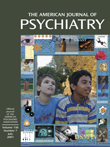The Role of Childhood Interpersonal Trauma in Depersonalization Disorder
Abstract
OBJECTIVE: In contrast to trauma’s relationship with the other dissociative disorders, the relationship of trauma to depersonalization disorder is unknown. The purpose of this study was to systematically investigate the role of childhood interpersonal trauma in depersonalization disorder. METHOD: Forty-nine subjects with DSM-IV depersonalization disorder and 26 healthy comparison subjects who were free of lifetime axis I and II disorders and of comparable age and gender were administered the Dissociative Experiences Scale and the Childhood Trauma Interview, which measures separation or loss, physical neglect, emotional abuse, physical abuse, witnessing of violence, and sexual abuse. RESULTS: Childhood interpersonal trauma as a whole was highly predictive of both a diagnosis of depersonalization disorder and of scores denoting dissociation, pathological dissociation, and depersonalization. Emotional abuse, both in total score and in maximum severity, emerged as the most significant predictor both of a diagnosis of depersonalization disorder and of scores denoting depersonalization but not of general dissociation scores, which were better predicted by combined emotional and sexual abuse. The majority of the perpetrators of emotional abuse were either or both parents. Although different types of trauma were modestly correlated, only a few of these relationships were statistically significant, underscoring the importance of comprehensively considering different types of trauma in research studies. CONCLUSIONS: Childhood interpersonal trauma and, in particular, emotional abuse may play a role in the pathogenesis of depersonalization disorder. Compared to other types of childhood trauma, emotional maltreatment is a relatively neglected entity in psychiatric research and merits more attention.



